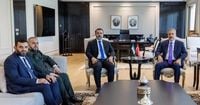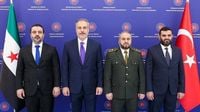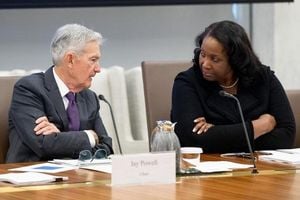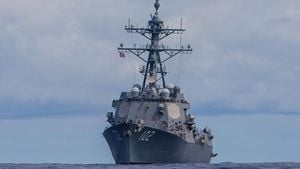On August 13, 2025, a significant shift unfolded in the Middle East as Turkey and Syria formalized a military pact in Ankara, signaling a new era of cooperation between the two neighbors. The agreement, signed by Turkish Defense Minister Yasar Guler and his Syrian counterpart Murhaf Abu Qusra, marks the most extensive security collaboration between Ankara and Damascus since the ousting of President Bashar al-Assad last year. According to Reuters and other regional outlets, the memorandum of understanding (MOU) sets the stage for Turkey to provide Syria with weapons systems, military training, logistical tools, and consultancy—an ambitious step to help the war-torn country rebuild its armed forces and security apparatus.
The deal, described by Turkish officials as a “joint training consultancy memorandum of understanding,” is more than a routine exchange of military expertise. It comes at a time of heightened instability in Syria, following deadly sectarian violence in the southern Suwayda region and repeated Israeli airstrikes targeting both Damascus and Sweida. The Syrian government, led by President Ahmed al-Sharaa, formally requested Turkey’s support in July 2025 as it faced mounting threats from internal strife and external actors. The Turkish Ministry of Defense emphasized that the agreement aims to “coordinate, plan military training and cooperation, provide consultancy, information and experience sharing, ensure the procurement of military equipment, weapon systems, logistical materials and related services.”
For Syria, the pact is a lifeline. Years of civil war have left its military battered, lacking discipline, training, and modern equipment. A Turkish defense ministry official told Reuters that, “the Syrian army was in need of restructuring after years of conflict, citing shortcomings in discipline, training, organisation, and modernisation.” According to the state-run Syrian Arab News Agency (SANA), the agreement’s core objective is to “improve the capabilities of the Syrian Army, develop its institutions, structure, and reform the security apparatus comprehensively.”
The symbolism of the signing ceremony in Ankara was unmistakable. Syrian Foreign Minister Asaad Hassan al-Shibani, General Intelligence Service Director Hussein Al-Salama, and Defense Minister Abu Qusra joined their Turkish counterparts, including Foreign Minister Hakan Fidan, for high-level talks that spanned not just military but also intelligence and diplomatic channels. The Turkish government has positioned itself as a central player in Syria, maintaining close relations with the new Damascus administration even as it continues to station troops in northern Syria from previous operations against Kurdish-led forces.
Turkey’s renewed engagement is not without controversy. For months, Ankara has expressed frustration over the slow implementation of a March 10, 2025, deal between Damascus and the Kurdish-led Syrian Democratic Forces (SDF)—a group Turkey views as an extension of the outlawed Kurdistan Workers’ Party (PKK). While the PKK has been engaged in disbandment and disarmament, the SDF’s YPG militia has refused to follow suit, fueling Turkish suspicions about their intentions. Ankara has repeatedly warned of potential military action if the SDF fails to integrate into the Syrian state, with a Turkish defense ministry source stating, “Our expectation is full compliance with the agreement that was signed and its urgent implementation in the field.”
The SDF, which controls much of Syria’s northeast and operates detention camps holding ISIS fighters, has been a flashpoint for regional tensions. On August 8, 2025, hundreds of representatives from Syria’s diverse ethnic and religious communities convened in the SDF-controlled city of Hassakeh to call for a decentralized state and the drafting of a new constitution. The move drew sharp criticism from the Syrian government, which accused the SDF of undermining national unity. Turkish Foreign Minister Hakan Fidan added fuel to the fire by accusing the SDF and Israel of “fueling certain difficulties” in Syria, warning that “Israel’s security cannot be achieved through undermining the security of [its] neighbors.”
Turkey’s stance is clear: while it supports a peaceful resolution to Syria’s crises, it will not tolerate what it deems “provocative and separatist” actions by the SDF. According to Middle East Eye, Turkish officials have completed preparations for limited support of Syrian army operations against the SDF if the group fails to comply with the March agreement. However, Ankara insists it will not directly intervene, preferring to offer indirect assistance and military advice.
Beyond the Kurdish question, the Turkish-Syrian military pact is also a response to repeated Israeli strikes in southern Syria. Despite Ankara’s efforts to mediate between Damascus and Jerusalem, frustration has grown in both capitals over what they see as Israeli attempts to shape Syria’s internal affairs, particularly in the Sweida region where Israel claims to be defending the Druze community. Turkish Foreign Minister Fidan reaffirmed Ankara’s commitment to a peaceful solution but made clear that Turkey would stand by Syria’s efforts to restore order and territorial integrity.
Independent analysts have raised concerns about the potential consequences of the new alliance. Sinan Ciddi, a senior fellow at the Foundation for Defense of Democracies, observed, “Ankara’s attempts to force the SDF to dissolve, disarm, and integrate into the Syrian state lack teeth and risk destabilizing Syria’s fragile unity. Turkey is unwilling to start a military conflict inside Syria. The Sharaa government also lacks the means to compel the SDF to dissolve, as the Kurdish-led fighting force is far superior to the military of the so-called central government.”
Ahmad Sharawi, a research analyst, warned that, “Tensions between the Syrian government and the Kurdish-led Syrian Democratic Forces are escalating. If this conflict spirals into a full-scale war with Turkish involvement, the repercussions will be far worse than what occurred on the coast with the Alawites or in southern Syria with the Druze. Northeast Syria holds ISIS detention camps; a battle would create chaos in which ISIS will emerge as the primary beneficiary.”
For now, the Turkish-Syrian military pact remains focused on training, equipping, and restructuring Syria’s military rather than direct intervention. Turkish officers are expected to oversee cadet training programs, share operational expertise, and provide technical support for new weapons systems. The agreement also establishes a framework for ongoing military advice and logistical cooperation, with the stated aim of helping Syria address both internal unrest and external threats like ISIS.
As the ink dries on the Ankara accord, the region watches closely. The deal could either stabilize a fractured Syria or set the stage for new conflicts if old grievances fester. What’s certain is that the balance of power in the Levant has shifted—and with so many actors, from Israel to the SDF to Turkey itself, pursuing competing interests, the coming months promise to be anything but dull.





